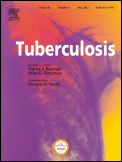
Tuberculosis
Scope & Guideline
Connecting research with practice in tuberculosis care.
Introduction
Aims and Scopes
- Pathogenesis and Immunology of Tuberculosis:
Research on the mechanisms by which Mycobacterium tuberculosis infects the host, evades the immune response, and the resulting immunological responses, including T-cell diversity and macrophage interactions. - Clinical Diagnosis and Biomarkers:
Studies focused on the development and validation of diagnostic tools and biomarkers for tuberculosis detection, including blood tests, imaging techniques, and molecular assays. - Drug Resistance and Treatment Strategies:
Exploration of drug-resistant strains of tuberculosis, mechanisms of resistance, and the evaluation of new therapeutic agents and treatment regimens to combat TB. - Epidemiology and Public Health:
Research on the epidemiological aspects of tuberculosis including transmission patterns, prevalence in different populations, and the impact of TB on public health. - Vaccine Development and Immunization Strategies:
Investigations into novel vaccines, their efficacy, mechanisms of action, and the role of host immunity in vaccine-induced protection against tuberculosis. - Environmental and Zoonotic Aspects of Mycobacteria:
Studies exploring non-tuberculous mycobacteria, their environmental reservoirs, and zoonotic transmission dynamics.
Trending and Emerging
- Host-Directed Therapies and Immunotherapy:
An increasing focus on therapies that enhance the host's immune response to tuberculosis, including novel adjunct therapies and biomarker identification that may guide treatment. - Molecular and Genetic Characterization of Strains:
A growing emphasis on understanding the genetic diversity and molecular mechanisms of drug resistance in Mycobacterium tuberculosis, facilitating targeted treatment approaches. - Impact of Comorbidities on Tuberculosis:
Research exploring the interplay between tuberculosis and other conditions, such as diabetes and HIV, is becoming more prevalent, highlighting the need for integrated management strategies. - Advanced Diagnostic Techniques:
There is a significant trend towards the development of rapid and sensitive diagnostic methods, including genomic and proteomic approaches, which are essential for timely TB detection. - Environmental and Zoonotic Mycobacteria:
Emerging studies on non-tuberculous mycobacteria and their interactions with human health and the environment are gaining attention, reflecting a broader understanding of mycobacterial diseases.
Declining or Waning
- Historical Perspectives on Tuberculosis:
Research focusing on the historical aspects and archaeological findings related to tuberculosis, while still relevant, appears to be less frequent as the journal shifts towards more contemporary issues of TB management and treatment. - Non-Clinical Models of Tuberculosis:
Studies utilizing animal models or in vitro systems for understanding TB dynamics are becoming less emphasized compared to clinical and epidemiological studies, indicating a potential waning interest in non-human models. - General Microbiology of Mycobacteria:
While the microbiological aspects of Mycobacterium species remain important, there is a noticeable decrease in non-specific microbiological studies, possibly due to a more targeted focus on tuberculosis-specific research.
Similar Journals
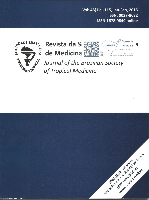
Revista da Sociedade Brasileira de Medicina Tropical
Illuminating the complexities of microbiology and parasitology.Revista da Sociedade Brasileira de Medicina Tropical is a distinguished open-access journal published by the Sociedade Brasileira de Medicina Tropical, focusing on the critical fields of Infectious Diseases, Microbiology, and Parasitology. Since its inception in 1972, this journal has committed to disseminating impactful research that addresses pressing global health challenges, particularly in tropical and infectious diseases prevalent in Brazil and beyond. With a robust publication history, it has been recognized as a Q3 journal in esteemed categories, reflecting its valuable contributions to scientific literature and its ranking in various Scopus categories, including a notable position in Parasitology. Researchers, professionals, and students are encouraged to engage with its rich repository of research, which has been freely accessible since 1997, fostering a wide-reaching impact on public health strategy and scientific innovation.
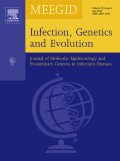
INFECTION GENETICS AND EVOLUTION
Pioneering Research at the Intersection of Genetics and EvolutionINFECTION GENETICS AND EVOLUTION is a premier scholarly journal published by Elsevier, focusing on the dynamic field of infection genetics and evolutionary biology. Since its inception in 2001, this journal has emerged as a critical platform for the dissemination of cutting-edge research, bridging the gap between molecular genetics, evolutionary theory, and infectious disease study. With an influence profound enough to secure its status in the Q1 category for Ecology, Evolution, Behavior and Systematics and impressive Q2 rankings in Genetics, Infectious Diseases, and Microbiology, the journal offers researchers unparalleled insights that advance the understanding of pathogen evolution and host interactions. Despite the lack of Open Access, the research published in this journal significantly contributes to the academic discourse and informs public health approaches. By publishing high-quality studies and reviews through 2024, INFECTION GENETICS AND EVOLUTION remains indispensable for academics, professionals, and students seeking to explore the intricate mechanisms of infection and adaptation in various organisms.

INFECTION
Advancing the Science of Infectious DiseasesINFECTION is a prestigious journal, published by Springer Heidelberg, that serves as a leading platform for the dissemination of critical research in the fields of Infectious Diseases, Microbiology, and Medicine. With an impressive Q1 ranking in multiple categories such as Infectious Diseases, Medicine (miscellaneous), and Medical Microbiology, the journal is recognized for its high-quality content and impactful contributions to the scientific community, as evidenced by its Scopus rankings placing it in the top 10th percentiles. Since its inception in 1973, and projected to continue until 2024, INFECTION has established itself as a vital resource for researchers, healthcare professionals, and students keen to explore the latest findings and advancements in infectious diseases. The journal provides a rigorous peer-review process, ensuring that only high-quality studies are published, making it an essential read for those seeking to deepen their understanding and stay abreast of the rapidly evolving landscape in infection research.

MEDICAL MICROBIOLOGY AND IMMUNOLOGY
Connecting microbial insights with immune system advancements.Medical Microbiology and Immunology is a renowned journal published by Springer, serving as a pivotal resource in the fields of microbiology and immunology. Established in 1971 and continuing its legacy through 2024, this journal features cutting-edge research and reviews that address critical advancements and challenges within these dynamic fields. With an impressive impact factor and a robust ranking, including Q1 categories in both Microbiology (medical) and Immunology, it stands at the forefront of scholarly communication, ranking 21st out of 140 in the realm of Medical Microbiology. Researchers and professionals are encouraged to explore a variety of studies that delve into the interactions between microorganisms and the immune system, making it an essential resource for anyone fascinated by these interconnected realms of health sciences. Although not open access, the journal is widely accessible through institutional libraries, ensuring that significant findings reach a global audience. The University of New York Plaza serves as its operational hub in the USA, reinforcing its international influence and dedication to advancing knowledge in microbiology and immunology.
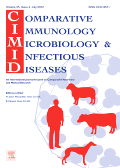
COMPARATIVE IMMUNOLOGY MICROBIOLOGY AND INFECTIOUS DISEASES
Enhancing Understanding Through Comparative AnalysesComparative Immunology Microbiology and Infectious Diseases, published by Elsevier Science Ltd, is a prominent journal dedicated to advancing the fields of immunology, microbiology, infectious diseases, and veterinary sciences. Established in 1978, this journal has become a vital resource for researchers and professionals alike, with a commendable impact factor that reflects its significance in academia. The journal, available in both print and electronic formats (ISSN: 0147-9571, E-ISSN: 1878-1667), stands out for its commitment to disseminating innovative research findings, particularly through its categorization in Q2 and Q3 quartiles across various related disciplines as of 2023. The journal aims to provide insightful comparative analyses that enhance our understanding of host-pathogen interactions, immune responses, and disease manifestations. With a global readership base, it serves as a platform for collaborative discourse among scientists and professionals, ultimately contributing to the improvement of health outcomes worldwide.

Microbiology Spectrum
Illuminating the intricate world of microorganisms.Microbiology Spectrum is a prominent peer-reviewed journal published by the American Society for Microbiology, dedicated to advancing the field of microbiology through the dissemination of high-quality research. Since its inception in 2013 and continuing until 2024, the journal has established a strong presence in key domains such as microbiology, immunology, cell biology, and ecology, achieving impressive quartile rankings including Q1 in Infectious Diseases and Q1 in Immunology and Microbiology as of 2023. With an emphasis on open access to its scholarly content, Microbiology Spectrum aims to foster collaboration and knowledge sharing among researchers, professionals, and students alike. The journal's scope encompasses a diverse range of topics pertinent to the field, making it an essential resource for anyone involved in microbiological research and its applications. Researchers looking to publish their findings in a respected journal will find Microbiology Spectrum's robust impact factor and Scopus rankings serve as testament to its significance and influence within the academic community.
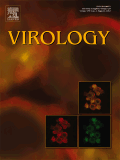
VIROLOGY
Illuminating the Impact of Viruses on HealthVirology, published by Academic Press Inc. Elsevier Science, is a prominent journal dedicated to advancing the knowledge and understanding of viral biology and pathogenesis since its inception in 1955. With a distinguished impact factor and recognized as a Q2 journal in the field of Virology for 2023, it ranks 38 out of 80 in the Scopus database for Immunology and Microbiology, placing it in the 53rd percentile among similar publications. This esteemed journal provides a platform for groundbreaking research, critical reviews, and comprehensive studies that contribute to our global understanding of viruses and their impact on health and disease. Although currently not an open-access journal, it remains accessible to a wide audience of researchers, professionals, and students who are keen to explore the latest advancements in virological research. The journal's scope encompasses a diverse range of topics, ensuring that it serves as an essential resource for anyone engaged in virology and related biomedical fields.
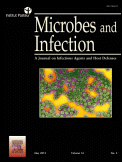
MICROBES AND INFECTION
Championing Open Access for Microbial InsightsMICROBES AND INFECTION is a premier academic journal published by Elsevier, dedicated to the dynamic fields of immunology, infectious diseases, and microbiology. With a notable impact factor reflective of its high-quality research contributions, the journal is categorized in the Q2 quartile across these fields as of 2023. Based in France and operating since 1999, MICROBES AND INFECTION offers a platform for researchers, professionals, and students to disseminate and access cutting-edge findings that drive innovation and knowledge in microbial and infectious disease research. The journal is ranked impressively within the Scopus database, securing ranks such as #16 in Microbiology and #33 in Infectious Diseases, underscoring its high relevance in the scientific community. Subscribers to the journal can expect an array of articles, reviews, and original research, all designed to advance understanding and improve clinical practices in the fight against infectious agents. With its ongoing commitment to open access options, MICROBES AND INFECTION continues to foster global collaboration and information sharing in the pursuit of addressing pressing microbiological challenges.
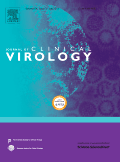
JOURNAL OF CLINICAL VIROLOGY
Exploring the Evolving Landscape of Viral InfectionsJournal of Clinical Virology, published by Elsevier, stands at the forefront of virology research, focusing on the clinical implications of viral diseases. With an impressive impact factor representative of its Q1 categorization in both Infectious Diseases and Virology, this journal is essential for researchers and healthcare professionals aiming to keep pace with evolving knowledge and treatments in virology. Since its inception in 1998, it has provided a vital platform for the dissemination of significant breakthroughs, now continuing through to 2024. The journal boasts competitive Scopus ranks, placing it in the 95th percentile for Infectious Diseases and the 91st percentile for Virology. Scholars can benefit from its selective Open Access options, promoting widespread access to cutting-edge research. With an ever-increasing demand for innovative solutions to viral infections, Journal of Clinical Virology remains dedicated to fostering advancements in the field, making it a key resource for anyone invested in virology and infectious disease management.

JOURNAL OF INFECTIOUS DISEASES
Advancing the Frontiers of Infectious Disease ResearchThe JOURNAL OF INFECTIOUS DISEASES, published by OXFORD UNIV PRESS INC, is a leading peer-reviewed journal dedicated to advancing the understanding of infectious diseases through high-quality research. With an impressive impact factor reflecting its prominence in the field—ranking in the Q1 category for both Immunology and Allergy and Infectious Diseases—this journal serves as a pivotal platform for researchers, healthcare professionals, and students alike. Its extensive history, spanning over a century since its inception in 1904, highlights its established authority and commitment to the field. Based in the United Kingdom, the journal covers essential topics from clinical management to epidemiological trends, providing vital insights that inform practice and policy. Although the journal is not open access, it remains accessible to a wide audience, ensuring that critical research continues to drive innovation and best practices in infectious disease management.